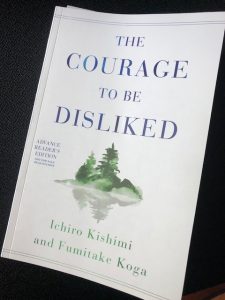Tag: individual psychology
The Courage To Be Disliked
Last month I was lucky enough to be given an advanced prepublication review copy of The Courage to Be Disliked by Ichiro Kishimi and Fumitake Koga (Atria Books, May 2018 release).
I say “lucky” because the book changed my life.
I had never heard of it before. But the book is a runaway bestseller in Japan. It sold 3.5 million copies in Asia.
- A million copies sold of any book is miraculous.
- Over three million copies sold in Japan alone is staggering.
The book is a dialogue between a student and a philosopher.
The messages are potent.
Most of the material stems from the work of psychologist Alfred Adler. As much as I’ve read in psychology, I wasn’t familiar with Adler.
I am now.
Adler (1870-1937) was an Austrain physician, psychotherapist, and the founder of Adlerian psychology, sometimes called Individual Psychology.
Around 1907 Adler and Freud, along with Rudolf Reitler and Wilhelm Stekel, began meeting weekly in a type of early mastermind. Their “Wednesday Night Meetings” eventually grew into the birth of the psychoanalytic movement.
Freud and Adler did not agree and went separate ways. I’m currently collecting and reading Adler’s works, such as Understanding Human Nature (1927) and The Science of Living (1929).
While I am digging into the original words of Adler, I find The Courage To Be Disliked an easier approach to understanding him.
Here’s why…
The Courage to Be Disliked is a refreshing stir for self courage.
Rather than giving away your power to circumstances, you use your power for choice.
The book explains etiology, which is the idea of cause and effect, versus teleology, which is the idea of meaning and choice.
“We are not determined by our experiences, but are self-determined by the meaning we give to them…” – Alfred Adler
In other words, many schools of thought (including Freud’s) say you are the product of your past and/or your environment.
That is cause and effect thinking, or etiology.
But Adler’s approach is to say you can create your life from new meaning and choice, which is teleology.
Obviously, the latter is more empowering and freeing.
The latter doesn’t need anything outside of you to change for you to change.
You can change with a decision.
The Adler way is not one of victimhood but of empowerment.
For example, rather than saying you are the way you are due to the circumstances of your childhood, or current circumstances, you instead choose to create how you want to be from goals selected out of this moment.
- The past has no hold over you.
- Environment has no hold over you.
- Others have no hold over you.
At first glance, the concepts in The Courage to Be Disliked could seem daunting and unrealistic.
But as I kept reading the book, and following the concepts being explained, I realized that this book is a manual for awakening.
There are too many concepts to repeat here, but one crucial one is this:
“All problems are interpersonal relationship problems.”
Let that sink in.
“All problems are interpersonal relationship problems.”
The idea (simplified) is that you may sometimes try to please others, which is giving away your power to others.
You can’t easily be happy if you are waiting on another’s approval.
When you choose yourself, you are free.
You may be disliked; but you are free.
But here’s an even deeper insight…
An advanced insight is this: you have an interpersonal problem with someone in order to justify something you don’t want to do.
In short, you created the need for an excuse and then created the interpersonal problem to rationalize the excuse.
The problem or person didn’t come first; your need for a way out did.
This is similar to my own observation:
“The meaning you give an event is the belief that attracted it.”
You don’t realize it, but it’s actually you and your meaning/beliefs creating your life.
This completely transforms the idea of problems with other people.
You created them!
The Courage To Be Disliked explains all of this, and more, in an easy to read style.
It’s simply a conversation.
But “the student” is asking what you would probably ask.
And “the philosopher” is responding as might Socrates, or Adler himself.
Along the way you get “aha” moments of insights.
For example, learning to separate tasks is important.
That means learning to understand what is under your task to do, and what is for others to do.
- Wanting someone to like you isn’t your task. It’s theirs.
- Wanting a child to clean his or her room isn’t your task. It’s the child’s.
- Wanting to be recognized for success isn’t your task. It’s the public’s.
Knowing this “task separation” gives you freedom.
“We cannot think, feel, will, or act without the perception of some goal.” – Alfred Adler
I’ve often referred to people trying to give me their task as them trying to give me their monkey.
They don’t want to care for “the monkey” so they try to pass it off to me.
But I have enough monkeys.
Knowing that I don’t want another monkey, and that their task isn’t mine to do, makes it easier for me to have a boundary and maintain it for my own self-care.
As a result, I can be free.
Here’s a recent example:
Jaime Vendera is a vocal coach. A terrific one. He’s written Raise Your Voice and The Ultimate Breathing Workout. He’s helped lots of singers, including me.
He wrote to me one day saying he had an idea for a book I could write. He suggested it could be about mindset for musicians.
While I liked the idea, I sensed he was passing a monkey to me.
So I wrote back, saying it was his idea, or his task, so he should write it.
To my surprise, and his credit, he took the challenge.
He completely wrote the book, showed it to me, and I added some content, and a subtitle to it.
We are now coauthors of the book, Mind Over Music: Break Through the Blocks to Get Into the Studio and Onto the Stage. (It’ll be out next month.)
Instead of my taking on his task, I simply kept my boundary and supported him.
The result was a win-win for both of us.
Do you see how this works?
The Courage to Be Disliked contains far more wisdom, theory, and technique than I could possibly relay in this article.
But I don’t want you to settle for this post.
I want you to read the book.
Whether you do or not, of course, is your task, not mine.
Ao Akua,
PS – The Courage To Be Disliked will be in stores May 8, 2018. You can order it in print, for your Kindle reader, or on audio right now at Amazon: https://smile.amazon.com/Courage-Be-Disliked-Phenomenon-Happiness/dp/1501197274/





